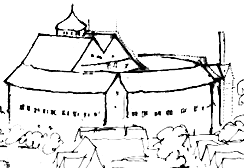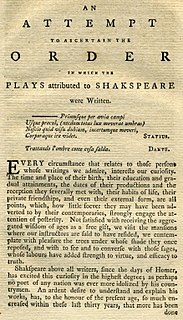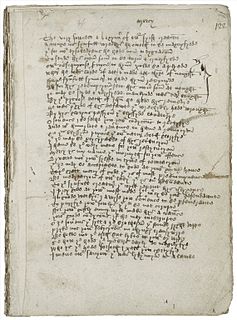
The Battle of Bosworth or Bosworth Field was the last significant battle of the Wars of the Roses, the civil war between the Houses of Lancaster and York that extended across England in the latter half of the 15th century. Fought on 22 August 1485, the battle was won by an alliance of Lancastrians and disaffected Yorkists. Their leader Henry Tudor, Earl of Richmond, became the first English monarch of the Tudor dynasty by his victory and subsequent marriage to a Yorkist princess. His opponent Richard III, the last king of the House of York, was killed during the battle, the last English monarch to die in combat. Historians consider Bosworth Field to mark the end of the Plantagenet dynasty, making it one of the defining moments of English history.

The Tragedy of Hamlet, Prince of Denmark, often shortened to Hamlet, is a tragedy written by William Shakespeare sometime between 1599 and 1601. It is Shakespeare's longest play, with 29,551 words. Set in Denmark, the play depicts Prince Hamlet and his revenge against his uncle, Claudius, who has murdered Hamlet's father in order to seize his throne and marry Hamlet's mother.

Macbeth was King of Scots from 1040 until his death. He ruled over a portion of present-day Scotland.

Richard III was King of England and Lord of Ireland from 1483 until his death in 1485. He was the last king of the House of York and the last of the Plantagenet dynasty. His defeat and death at the Battle of Bosworth Field, the last decisive battle of the Wars of the Roses, marked the end of the Middle Ages in England. He is the protagonist of Richard III, one of William Shakespeare's history plays.

William Shakespeare was an English playwright, poet, and actor, widely regarded as the greatest writer in the English language and the world's greatest dramatist. He is often called England's national poet and the "Bard of Avon". His extant works, including collaborations, consist of some 39 plays, 154 sonnets, three long narrative poems, and a few other verses, some of uncertain authorship. His plays have been translated into every major living language and are performed more often than those of any other playwright. They also continue to be studied and reinterpreted.

The Globe Theatre was a theatre in London associated with William Shakespeare. It was built in 1599 by Shakespeare's playing company, the Lord Chamberlain's Men, on land owned by Thomas Brend and inherited by his son, Nicholas Brend and grandson Sir Matthew Brend, and was destroyed by fire on 29 June 1613. A second Globe Theatre was built on the same site by June 1614 and closed by an Ordinance issued on 6 September 1642.

The Merry Wives of Windsor or Sir John Falstaff and the Merry Wives of Windsor is a comedy by William Shakespeare first published in 1602, though believed to have been written in or before 1597. The Windsor of the play's title is a reference to the town of Windsor, also the location of Windsor Castle, in Berkshire, England. Though nominally set in the reign of Henry IV or early in the reign of Henry V, the play makes no pretence to exist outside contemporary Elizabethan era English middle class life. It features the character Sir John Falstaff, the fat knight who had previously been featured in Henry IV, Part 1 and Part 2. It has been adapted for the opera at least ten times. The play is one of Shakespeare's lesser-regarded works among literary critics. Tradition has it that The Merry Wives of Windsor was written at the request of Queen Elizabeth I. After watching Henry IV Part I, she asked Shakespeare to write a play showing Falstaff in love.
Ralph Roister Doister is a sixteenth-century play by Nicholas Udall, which was once regarded as the first comedy to be written in the English language.

This article presents a possible chronological listing of the composition of the plays of William Shakespeare.
Liberality and Prodigality is a morality play by an unknown author from c.1567. Its title page also reads: "As it was played before her Maiestie. London Printed by Simon Stafford for George Vincent, and are to be sold at the signs of the Hand in hand in Wood-street over against S. Michaels Church."

The Shakespeare apocrypha is a group of plays and poems that have sometimes been attributed to William Shakespeare, but whose attribution is questionable for various reasons. The issue is separate from the debate on Shakespearean authorship, which addresses the authorship of the works traditionally attributed to Shakespeare.

In Shakespearean scholarship, Henriad refers to a group of William Shakespeare's history plays. It is sometimes used to refer to a group of four plays, but some sources and scholars use the term to refer to eight plays. In the 19th century, Algernon Charles Swinburne used the term to refer to three plays, but that use is not current.

Shakespeare's plays are a canon of approximately 39 dramatic works written by English poet, playwright, and actor William Shakespeare. The exact number of plays—as well as their classifications as tragedy, history, or comedy—is a matter of scholarly debate. Shakespeare's plays are widely regarded as being among the greatest in the English language and are continually performed around the world. The plays have been translated into every major living language.

Mankind is an English medieval morality play, written c. 1470. The play is a moral allegory about Mankind, a representative of the human race, and follows his fall into sin and his repentance. Its author is unknown; the manuscript is signed by a monk named Hyngham, believed to have transcribed the play. Mankind is unique among moralities for its surprising juxtaposition of serious theological matters and colloquial dialogue. Along with the morality plays Wisdom and The Castle of Perseverance, Mankind belongs to the collection of the Folger Shakespeare Library in Washington, D.C. as a part of the Macro Manuscript.

Medieval theatre encompasses theatrical performance in the period between the fall of the Western Roman Empire in the 5th century and the beginning of the Renaissance in approximately the 15th century. The category of "medieval theatre" is vast, covering dramatic performance in Europe over a thousand-year period. A broad spectrum of genres needs to be considered, including mystery plays, morality plays, farces and masques. The themes were almost always religious. The most famous examples are the English cycle dramas, the York Mystery Plays, the Chester Mystery Plays, the Wakefield Mystery Plays, and the N-Town Plays, as well as the morality play known as Everyman. One of the first surviving secular plays in English is The Interlude of the Student and the Girl.

Theatre of United Kingdom plays an important part in British culture, and the countries that constitute the UK have had a vibrant tradition of theatre since the Renaissance with roots going back to the Roman occupation.

Horestes is a late Tudor morality play by the English dramatist John Pickering. It was first published in 1567 and was most likely performed by Lord Rich's men as part of the Christmas revels at court that year. The play's full title is A new interlude of Vice containing the history of Horestes with the cruel revengement of his father's death upon his one natural mother. It has been proposed that John Pickering is likely to be the same person as lawyer and politician Sir John Puckering.

Drama is the specific mode of fiction represented in performance: a play, opera, mime, ballet, etc., performed in a theatre, or on radio or television. Considered as a genre of poetry in general, the dramatic mode has been contrasted with the epic and the lyrical modes ever since Aristotle's Poetics —the earliest work of dramatic theory.
William Walton's music for the 1944 film Henry V has been arranged by several musicians for non-cinematic performances. The first suite was arranged in 1945 by the conductor Malcolm Sargent. In 1963 Muir Mathieson, who had conducted the music for the original film soundtrack, arranged a longer suite, and in 1988 the musicologist Christopher Palmer constructed an hour-long "Shakespeare Scenario" using most of the music Walton composed for the film.

The Macro Manuscript is a collection of three 15th-century English morality plays, known as the "Macro plays" or "Macro moralities": Mankind, The Castle of Perseverance, and Wisdom. So named for its 18th-century owner Reverend Cox Macro (1683–1767), the manuscript contains the earliest complete examples of English morality plays. A stage plan attached to The Castle of Perseverance is also the earliest known staging diagram in England. The manuscript is the only source for The Castle of Perseverance and Mankind and the only complete source for Wisdom. The Macro Manuscript is a part of the collection at the Folger Shakespeare Library in Washington, D.C.. For centuries, scholars have studied the Macro Manuscript for insights into medieval drama. As Clifford Davidson writes in Visualizing the Moral Life, "in spite of the fact that the plays in the manuscript are neither written by a single scribe nor even attributed to a single date, they collectively provide our most important source for understanding the fifteenth century English morality play."

















